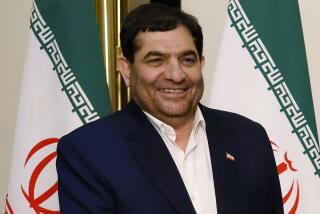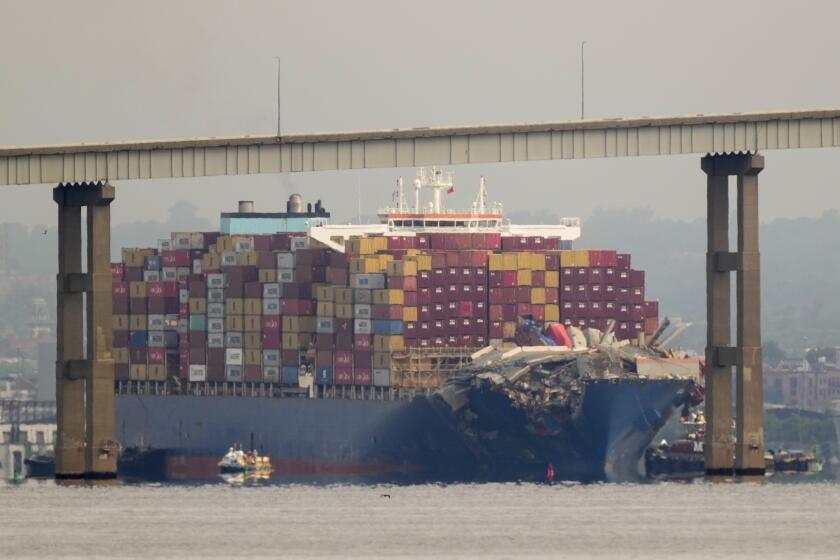By Stepping Aside, China’s Jiang Made His Mark on History
Perhaps nothing in Jiang Zemin’s time in power became him like the leaving of it.
As he stepped down this week after 13 years as Communist Party chief in favor of a younger replacement, the 76-year-old leader may have moved a step closer to his yearned-for recognition as one of the great figures in modern Chinese history.
In a country used to purges and heavenly mandates for its rulers, his relinquishing of the top job set a precedent for voluntary retirement by China’s leaders, who have historically clung to office as long as possible.
“In terms of Chinese politics, this is pretty significant,” said Dali Yang, a political scientist at the University of Chicago, who predicted that the transition will serve as a blueprint for passing on power from one generation to the next.
Besides Jiang, five other senior officials gave up their party posts this week, completing the most orderly transfer of authority in 53 years of Communist rule. The new crop of leaders will be led by Vice President Hu Jintao, 59, named party chief Friday.
Not that Jiang will disappear into the twilight. He succeeded in stacking the upper echelons of power with loyalists, ensuring he will have at least an informal say in major decisions in the short term. He retains control of the party’s military commission, which oversees the world’s largest standing army, and isn’t due to hand over the title of president to Hu until March.
But his retirement from the most important post of all, Communist Party general secretary, is a sign of progress in a country often governed by personality and whim, analysts say.
“This transition marked a big step forward in the institutionalization of the succession process,” said Andrew Nathan, a China scholar at Columbia University. “Jiang was not purged before his time in office came to an end -- he left office peacefully. The military did not intervene or exert any influence that I can see. The elders did not intervene.”
Jiang’s voluntary exit, along with the return of Hong Kong to Beijing’s control, the country’s weathering of the Asian financial crisis, its accession to the World Trade Organization and the effort to divest the military of its business interests, will figure high on China’s list of achievements under Jiang.
But he also leaves behind glaring problems, such as the dangerously large gap between China’s nouveaux riches and its unrelieved poor, which has led to protests by out-of-work laborers and farmers.
And a smoother, more rules-based succession is but a small improvement when measured against the fact that China remains a single-party state that crushes organized opposition.
Those hoping that the Hu era will usher in political reforms to match China’s economic and social changes are likely to be disappointed. The regime, even in its new form, remains committed to liberalizing China’s economy but preserving the party’s grip on power.
“It’s common wisdom that the party has to move in the direction of [economic] reform and opening up. Nobody would dare switch direction, because otherwise it’ll lead the party to its grave,” said Zhang Lizhong, 60, a retired party cadre. “But there hasn’t emerged a figure like [final Soviet President Mikhail S.] Gorbachev in China yet. So don’t expect too much.”
Much has been made of Hu’s relative youth in a country where white, dyed or no hair seems a prerequisite for an office in Zhongnanhai, the central government compound. In popular political parlance, Hu and his cohorts are members of the “fourth generation” of leaders, in line after Mao Tse-tung, Deng Xiaoping and Jiang.
This is the generation that found promising young careers interrupted or ended by the 1966-76 Cultural Revolution, when Mao’s tumultuous campaign of “class struggle” trumped concepts of merit and common sense. The excesses of the period instilled in Hu’s technocratic generation an aversion to radical ideology and a preference for pragmatism.
But that doesn’t mean support for liberal democratic ideals. Hu and his cohorts were weaned on the idea of strong centralized rule and the primacy of the Communist Party.
Real political reform, many scholars predict, won’t be in the cards until a takeover by the fifth generation, many of whom cut their teeth in the post-Mao era and were educated in the West.
“I do not expect to see any political breakthroughs in the way China is governed for at least another decade,” said Joseph Fewsmith, an expert on Chinese politics at Boston University.
Observers therefore don’t expect the new leaders to enact a bold vision for China’s future.
This is especially true now that the inner sanctum of Chinese politics, the Politburo Standing Committee, has been expanded from seven members to nine -- a victory for Jiang, who was able to get five proteges onto the ruling body.
Government decision-making in China these days is an exercise in consensus-building, in contrast to the diktats issued by leaders such as Mao or Deng.
“Hu’s special skill is consensus-building,” Nathan said. Hu “can lead as a convener and spokesman for the collective. That may be all that he aims at and what he is good at.”
Even if Hu has a vision for China, his colleagues would constrain him from pushing it through.
As it is, hardly anything is known of Hu’s personal views. He has managed to rise to the top mainly, it seems, by being cautious, having powerful patrons and showing respect for the old guard, particularly Jiang.
Until he can build up his power base and move allies into key positions, analysts expect that he will continue the policies of the previous administration.
Membership in the WTO will pry open protected markets and put China on a more equal trade footing with other countries. Experiments in rural tax reform will go on, as will attempts to reweave a social safety net.
“Partly under Jiang and [Premier] Zhu Rongji, a lot of the tough reforms have already been undertaken,” said Yang of the University of Chicago. “Hu Jintao and his colleagues really inherit a much calmer policy agenda.”
What political reform there is will probably occur at the edges -- for example, in further streamlining of China’s bureaucracy or making party positions more competitive. “Nothing that will rock the boat,” Yang said.
One area where the new regime is expected to press forward is the protection of private property and business, an indication of just how much the party has changed from its unreconstructed Marxist days.
Jiang’s keynote speech at the congress last week explicitly called for the protection of private property. This week, the congress gave its formal blessing to his campaign to let capitalists join the Communist Party.
And for those in Washington keeping an eye on the shake-up in China’s leadership, Beijing is likely to continue making warmer Sino-U.S. ties a pillar of its foreign policy.
Relations have improved somewhat since the standoff over a U.S. spy plane that collided with a Chinese fighter jet 18 months ago. Last week, Beijing surprised many observers by voting with the U.S. in favor of a U.N. resolution against Iraq.
Analysts detect a shift in China’s foreign policy from emphasizing solidarity with the developing world to acting as the big power it increasingly wants to be. This bodes well, experts say, for Sino-U.S. relations.
More to Read
Start your day right
Sign up for Essential California for news, features and recommendations from the L.A. Times and beyond in your inbox six days a week.
You may occasionally receive promotional content from the Los Angeles Times.







